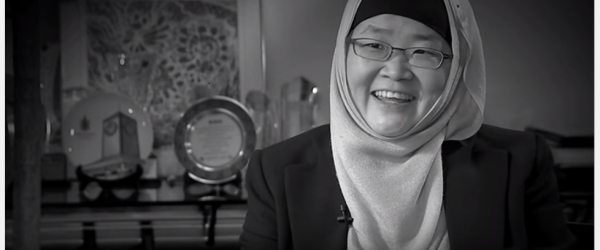One of the biggest problems that Muslim women face today is the need to deconstruct and reconstruct narratives of ourselves in the media. (That’s why Muslimah Media Watch exists, amirite?) A recent interview of Professor Jackie Ying, a Chinese Muslim scientist in Singapore, by a Singaporean Malay language news channel shows that this need can exist just as painfully among Muslims themselves.
50-year-old Professor Ying is presently the Executive Director of the Institute of Bioengineering and Nanotechnology in Singapore. Born in Taiwan, she came to Singapore at the age of seven to complete her primary and secondary school education. At the age of 15 her family moved to New York, and she attended high school and The Cooper Union to complete a bachelor’s degree in chemical engineering. Afterwards, she obtained her MA and PhD from Princeton University. In 2001, she became one of the youngest full professors at the Massachusetts Institute of Technology (MIT).
The interview was brought to my attention through a blogpost by Singaporean blogger Zaihan, in which he highlighted the problematic ‘entanglement’ of race and religion. (The blog was last accessed on 26 Feb 2016 and seems to be currently unavailable.)
“Due to her choice of converting to Islam about 15 years ago, Professor Ying is somehow now seen as a representative of the Malay/Muslim community. She was asked to comment on issues that this group faces; on how she would change or improve interest in the sciences amongst the youth of the demographic, for example. She was even prodded to share the “kemelayuan”—Malayness, in short—that she sees in herself. It’s so strange because she is Muslim, but not Malay. She was not quite able to answer so many of these queries levelled at her, because she had not lived as a Malay (…)”
In Singapore, just like in Malaysia, ethnicity and religion are deeply intertwined. To be a Malay often means to be Muslim, and Muslim converts are usually expected to adopt Malay practices. Elsewhere in MMW I wrote that “these two terms [Malay and Muslim] are often used interchangeably.” One problem with this false equivalence of terms is that it erases the experiences of Muslims of other ethnicities, like Professor Ying herself. However, this is something that is sometimes reinforced by the ehnic group itself, in this particular case, the Malay community, as highlighted by blogger Zaihan:
“The blatant manner that Berita Harian and local Malay news programmes claim her amazing achievements (she is truly prolific and well-decorated) as a Malay-Muslim point of pride—simply by virtue of her holding the same faith as their target readers—is not only very silly but also insulting to her journey.”
The other problem with equating Malays and Muslims is the discursive erasure of Malays of other religions, even though they make up a very small percentage of the population. One’s religious identity takes precedence over any other identities.
In the half-hour clip, the interviewer asks several questions that assume that Professor Ying somehow would understand what it means to be Malay, just because she converted to Islam. The interviewer poses these questions:
- What is the reason behind the low numbers of Malay Muslims participating in science and research?
- What more can the Malay Muslim community do to encourage, ensure and produce a group of science practitioners?
- Do you see any Malay Muslims [in your institute] who have the potential to be [a Nobel Prize winner]?
Professor Ying works with the local Malay/Muslim community through Yayasan Mendaki, a “self-help” semi-governmental organisation. She mentors young Muslims interested in science by giving them the opportunity of working on research projects in her laboratory. While she could not answer these questions from the perspective of a Malay, she did have insights from the perspective of an educator.
She highlighted the shortcomings of science education, and she said,”I think it’s the same problem for everybody. Students learn science as a fairly dry subject.” Furthermore, she spoke about the emphasis on exams and early streaming, “Doing well academically is different from being able to do research well in the lab. We have too much of a civil service mindset.”
Even though the interviewer’s questions framed her as having to speak for the Singaporean Malay community by virtue of being Muslim, I think she managed to steer the conversation away to – as much as she could – create her own representation. The struggle continues for Muslim women to create their own narratives and resisting those imposed on them.
“I think from being young, we wanted to grow up to be individuals. It was important for me that my parents did not set me in certain pigeonholes. They are very accepting of who I am (…) Of course society is a different story. We have a lot of constraints. But because my parents never set those limitations, I never felt there was something I couldn’t do. I think it’s that: we set our own challenges that makes it possible for us to try different things.”
In Singapore, the conflation of ethnicity and religion erases individual narratives, as Professor Ying highlights here. However, with this interview she has given us an example of how to resist dominant media narratives – an example both media makers and participants can learn from.

